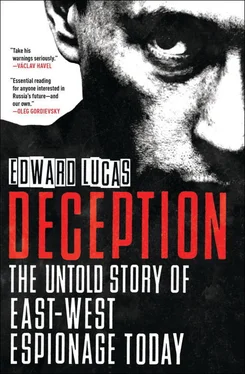With proper legal representation, these ludicrous cases would have been easy to win. But the stolen Hermitage companies did not have proper lawyers. In a complaint to the Russian chief prosecutor, Yuri Chaika, Hermitage says of its supposed representatives that it:
Had no prior knowledge of, or acquaintance with, these lawyers… never hired or appointed them and… never authorised or ratified their appointment as attorneys or agents of any kind. 8
Instead of defending their clients against the preposterous allegations of non-existent breaches of bogus contracts, backed by palpably phoney evidence, the lawyers simply accepted full liability. The judges in the cases showed a striking lack of curiosity about the proceedings. For example: if the two parties agreed, why had it been necessary to go to court at all? Rather than ask such uncomfortable questions, they immediately ruled that the companies had to pay the damages sought. Having gained his victory, Lieutenant Colonel Kuznetsov then approached some of the biggest banks in Moscow. He produced a narrowly drafted warrant giving him the power to locate any assets belonging to Kameya – but demanded details of all assets belonging to Hermitage. Some complied either fully or in part, prompting furious complaints from Hermitage. Only the Duch bank ING, to its credit, bluntly declined, pointing out that the warrant bore no relation to the information sought.
At any rate, the assets were phantom and the search for them a sideshow. The real victim, the Russian taxpayer, was moving into sight. The fraudsters’ henchmen, now posing as the legal owners of the company, used the judgment to argue that its past profits were now illusory, and the tax paid on them must be refunded. On 24 December 2007 they filed amended tax returns for 2006. These argued that as the new court judgments had wiped out the Hermitage companies’ taxable profits in that year, they were therefore entitled to a refund of the $230m in capital gains taxes these companies had paid. This was a striking and substantial claim that in any normal tax system would have been subject to thorough and lengthy scrutiny. Making the Russian tax authorities disgorge even the smallest and simplest refund is mind-bendingly slow and difficult. But thanks to the patronage of the FSB and other powerful institutions (the Interior Ministry and the upper reaches of government), the claimants won agreement for their refund – thought to be the largest single such payment in Russian financial history – from the two tax authorities concerned in a single day. [13] m The 5.4bn roubles was paid out within two days via a newly created account at Universal Savings Bank. This was a curious institution. Two nominee shareholders in the bank were also shareholders in the three obscure companies that became the owners of the stolen Hermitage companies. The main beneficial shareholder is a convicted criminal called Dmitri Klyuev, who has past links to other questionable FSB-related transactions. In the summer of 2008, once Hermitage started firing its legal salvos, the bank filed for voluntary liquidation.
The payment was premature: one of the court judgments did not even come into effect until 11 January. Even the simplest checks by the tax authorities would have shown that the transaction was fraudulent. Although two officials of the tax authorities gave sworn statements that they had made all possible and necessary checks before authorising the transactions, it is hard to square this with reality. Russian bureaucrats are known for many things, but not for a happy-go-lucky attitude to paperwork, nor for working extremely quickly. If the statements from the officials are to be believed, they made a series of extensive and complex checks with other state agencies, and received completely satisfactory replies, all in the space of a few hours in late December when Russia is shutting down for its lengthy New Year festivities.
It may be illustrative to imagine what would have happened if such a fraud were attempted in a Western country. Mr Browder would have immediately secured a court order preventing the fraudsters using the property they had acquired. Even a whiff of official involvement in a crime of this scale would alert the media (and the blogosphere). Lawmakers would ask questions; bodies that represent business would make complaints too; and anti-corruption agencies would take a hard look at the behaviour of the officials concerned. None of these mechanisms works properly in Russia. On paper, the state is accountable in all these ways, but in practice using them is mostly useless – and in some cases actually dangerous.
Between 3 and 11 December 2007 Hermitage had submitted no fewer than six lengthy complaints detailing the theft of the companies. Two went to the chief prosecutor – who promptly passed them to Major Karpov. Unsurprisingly, no action followed. Two went to the department of the Interior Ministry that deals with internal corruption issues. It declined to take action, with the Kafkaesque justification: ‘We are unable to open an inquiry into an investigator when such an inquiry is requested by the target of the investigator’s current work.’ One went to the St Petersburg branch of the Russian State Investigative Committee, which replied that it could find nothing amiss. The sixth went to the same body’s federal offices, which opened a low-level inquiry on 5 February. That delay cost the Russian taxpayer $230m.
The robbers now had their loot. But they were still at risk of being found out. The fraud was not an elegant one. Whether from carelessness or complacency, the phoney documentation was littered with mistakes. Moreover Hermitage was firing salvoes of official complaints inside Russia, and was running an effective PR campaign abroad. It was time for a criminal case against the pesky foreigners to scare them into silence.
The authorities had to try to prove that Hermitage had done something wrong. If the evidence did not exist, it must be invented. On 26 February, Karpov, Kuvaldin and two of Kuznetsov’s other subordinates flew to the provincial city of Elista, capital of Kalmykia. This republic is one of the poorest and oddest places in Russia, Buddhist by religion and long ruled by a chess-mad despot called Kirsan Ilyumzhinov. Like many investors in Russia, for tax purposes Hermitage had established its investment subsidiaries there. [14] n The federal authorities abolished this loophole in 2002. In 2006 they ended another quirk, a two-tier market in Gazprom shares. This had created a lucrative opportunity for investors (including Hermitage) to buy locally listed ones for foreign clients at a large and legal discount.
As a ‘Free Economic Zone’ – one of eleven in Russia – the republic was an onshore tax haven, with an 11 per cent tax rate on corporate profits, against 35 per cent in Moscow. Hermitage also used another tax break aimed at promoting the employment of disabled people. In 1996 it had hired four such staff, nominated by the Kalmykian authorities, for the undemanding task of sending press clippings on a monthly basis. 9Investigators in Elista had on several occasions, most recently in 2004, started looking at Hermitage’s tax affairs, each time ruling that no crime had taken place. The law offered little scope for further pursuit: the deadline for collecting tax debts had expired. But in 2008 the visitors from Moscow had little difficulty in persuading their Elista colleagues to reopen a case and to transfer the investigation to the Russian capital. They summoned a local investigating officer back from vacation. Witnesses interviewed in the FSB office in Elista readily agreed to change their story, saying that Hermitage had never actually paid them. (Hermitage has produced payment orders to support its position.)
Whether or not Hermitage’s conduct in all this was flawless, average, or questionable is not the point here. Nothing in its activities, in any legal system imaginable, would carry sanctions including the criminal prosecution, arbitrary imprisonment, or physical abuse leading to death of one of its lawyers. Yet that is just what happened. On 5 May 2008 Kuznetsov initiated a criminal case against not Hermitage itself, but its lawyers, claiming they did not have genuine powers of attorney to represent their client: in effect, he was saying that the only person who could legally represent the company was the person who stole it. That marked a grim step to lawlessness. A lawyer is an officer of the court, bound to do his professional best to make his client’s case clearly and convincingly. It is a sure sign of a rotten legal and political system when lawyers are punished for the crime of representing their clients. When I tried to explain this case to a friend, he asked in innocent puzzlement: ‘Why didn’t they call the police?’ That question highlights the gulf between the way Russia works and the standards expected in the West. In this case, the criminals were the police, as Mr Magnitsky discovered when he tried to find out what had happened to his complaints against Kuznetsov and Karpov. Far from being independently investigated, these had been forwarded to the men themselves. On attending the Investigative Committee offices in Moscow to give a deposition, he was surprised to see Kuznetsov there – officials explained this by saying that he was ‘assisting’ them.
Читать дальше












